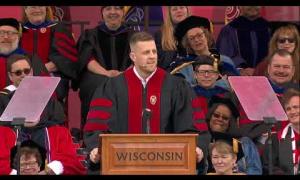Rhetorical Triumph, the Anatomy Of
July 10, 2012
Five days after President Kennedy’s assassination, President Johnson had to give what he told speechwriter Liz Carpenter was “the most important speech he would ever give,” to a joint session of congress. The speech had to be prepared amid the Kennedy funeral ceremonies and an astonishing number of other meetings and crucial strategic phone calls and near sleepless nights.
Drafts for the speech were solicited from a number of speechwriters, but Kennedy’s scribe Ted Sorensen, who had reluctantly agreed to stay on with President Johnson—to see that Johnson stuck with Kennedy’s message and language on civil rights, he said—rejected most of the work of the others.
Sorensen’s draft contained a few lines that Johnson rejected, including, “I who cannot fill his shoes must occupy his desk.”
Johnson made other edits too, alone in the Oval Office, hours before the speech.
His edits were small, but they added drama. The text in front of Lyndon Johnson included the phrase “the dream of education for our youth.” Johnson changed it to “the dream of education for our children.” The text spoke of the dream of “jobs for all who seek them.” “For all who seek them—and need them,” Johnson wrote in. The text urged the passage of Kennedy’s tax bill “for which he fought.” “For which he fought—all this long year,” Johnson added. It urged the passage of Kennedy’s civil rights bill “for which he fought.” “For which he fought so long,” Johnson added.
And the text wasn’t being edited just for drama.
It was being edited—by this man who knew that he had never been able to speak effectively before large audiences—to help him speak effectively this time, the most important time. To try to keep himself from rushing through it, blurring its meaning and its force—as, for thirty years, despite every effort, he had almost invariably done—he had it retyped in one-sentence paragraphs in an attempt to make himself pause between the sentences. Then, because he had used that device before and it hadn’t worked, he reinforced it by writing in, in hand, between many paragraphs as a reminder to himself, “Pause.” And then, as if he was afraid he would nevertheless still speak too fast, he wrote “Pause—Pause.”
The time spent recruiting Sorensen—and editing the speech Sorensen wrote—paid off.
“All I have I would have gladly given not to be standing here today,” he began.
The sentence was eloquent, sorrowful. A hush fell over the Chamber, the hush of hundreds of men and women so intent on a speaker’s words that they barely moved.
“The greatest leader of our time has been struck down by the foulest deed of our time,” he said. “Today John Fitzgerald Kennedy lives on in the immortal words and works that he left behind. He lives on in the mind and memories of mankind. He lives on in the hearts of his countrymen.”
The next lines on the page in front of Lyndon Johnson were “No words are sad enough to express our sense of loss. No words are strong enough to express our determination to continue the forward thrust of America that he began.” But the words as Johnson spoke them did express that sense and that determination—because of the way he spoke the: so slowly, with a deep, grave dignity behind them, that they seemed to reverberate across the rows of listeners before him and above him. …
And then he came to the part of the speech actually drafted by his own longtime speechwriter, Horace Busby; these lines harked back to Sorensen’s inaugural address for Kennedy, and Sorensen had left them in:
“On the 20th day of January, in 1961, John F. Kennedy told his countrymen that our national work would not be finished ‘in the first one thousand days, nor in the life of this administration, nor even perhaps in our lifetime on this planet. But,’ he said, ‘let us begin.’”
Johnson paused, and there was the thrust of his head again and the narrowed eyes, narrowed almost into slits, and the stern hard mouth and the jaw jabbing out as he said. “Today, in this moment of new resolve, I would say to all of my fellow Americans, let us continue.
“This is our challenge,” Johnson said, “not to hesitate, not to pause, not to turn about and linger over this evil moment, but to continue on our course so that we may fulfill the destiny that history has set for us.”
He concluded the speech by slowly, steadily speaking the lines, “America, America, God shed his grace on thee. And crown thy good with brotherhood, from see to shining sea.”
The speech had been interrupted by applause 31 times and the ovation at the end was thunderous—in the hall as it would be in the press the next day.
“Yet it wasn’t the applause that most forcefully struck some of the reporters watching the scene from the Press Gallery, but the tears. “Everywhere you looked,” Hugh Sidey said, “people were crying.”

